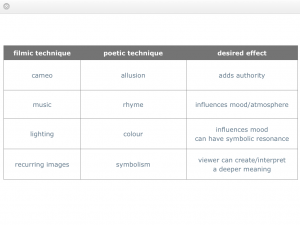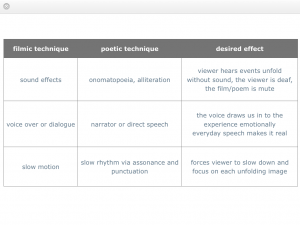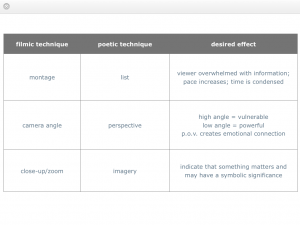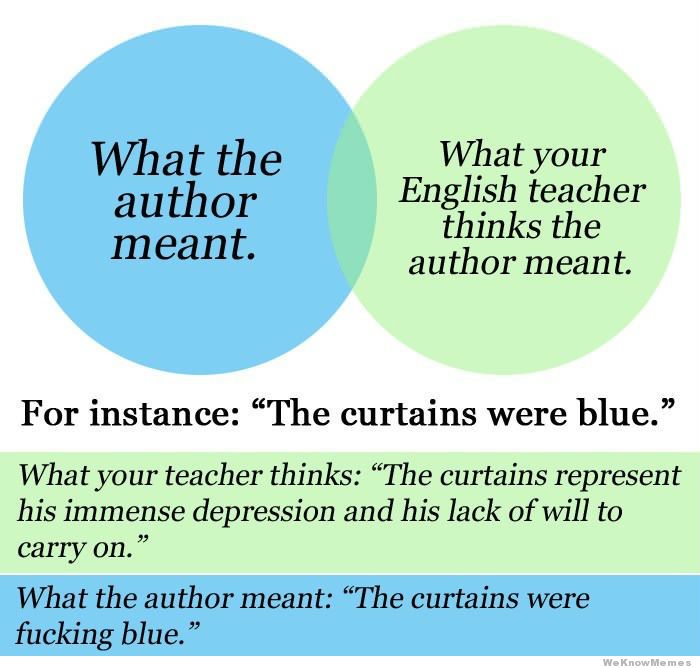Two years ago I started messing around with film-making with my junior classes. I had no real idea what we were doing and no real justification for doing it. All I knew is that I loved making short films and youtube videos and I felt that maybe my students would too.
As English teachers it can be difficult to know where our role begins and ends. We feel responsible for the first two of the three so-called r’s – reading, writing and arithmetic but beyond that all is fuzzy. Is digital literacy something we should be teaching? And if so, who teaches us? What about finding an audience for our students’ work beyond the classroom? Should we be blogging and tweeting and broadcasting our students’ creative work? How do we do this without our students’ exploits coming back to haunt them in years to come? Does publishing their work just make them visible or does it also make them vulnerable? What about drama – is it enough to study plays or should we be acting, directing and producing them too? And when in the name of all that is sacred do we get to do all of this when the average amount of time we spend with any of our junior classes is about 2hrs 40 mins a week?
For me, film ticks a lot of the boxes we know for certain that we should be ticking! It has the capacity to develop writing skills; confidence in public speaking; and acting skills. It also provides opportunities for meaningful collaboration and helps to develop students’ creativity. If you want to now point out to me that making movies is not part of our job description, then I shall nod and say ‘you are absolutely correct!‘ The only defence I can offer is that film is part of the senior cycle curriculum but most of us treat films as just another ‘text’ to be picked apart and critiqued not as something we might actually make with our students. This is probably because, let’s face it, if it ain’t assessed it ain’t considered terribly important. Perhaps much more importantly, the curriculum is already groaning under it’s own weight, never mind adding an extra unnecessary layer to the mix to collapse it entirely.
So where am I going with all this? Well, two years ago my first years and I were covering the normally very boring topic of “Writing Guidelines” in class and the students asked if we could write, film and edit a dramatisation of our “10 rules for surviving first year”. I said ok and this was quickly followed by a sequel “10 rules for surviving second year” when the second years got wind of what the first years had been doing and got jealous! We had fun but I had trouble shaking the nagging feeling that we were sort of just having the craic and that I was somehow being irresponsible not doing the serious work of learning that happens with books and biros and heads down in a silent classroom.
It was only after the process was complete that the value of the experience gradually made itself known to me. Immediately afterwards we started to study poetry. The students saw themselves as creatives now, rather than simply as critics. They could see the value of using slow motion to add to the drama; they could appreciate the use of a lingering close-up to emphasise the symbolic importance of an object, a gesture, a moment in time. They spoke as people who had gone through a creative process and come out the other side. They got it.
Here’s a video I made during the summer for an iBooks project I worked on for Apple as part of my ADE experience. It briefly outlines the process. Apologies for the abrupt ending, I wanted to cut out the last sentence but, as you may have gathered, when I start talking I barely draw breath so there was no room for gradually fading me out!
[youtube_sc url=http://www.youtube.com/watch?v=bcAGYLSovKE&feature=youtube]
Meanwhile, back to the present tense. Due to an overloaded curriculum and an intolerance amongst students and parents for spending time on anything that isn’t directly related to something that will appear on their Leaving Certificate examination paper, my two fifth year English classes (we’re pretty short on English teachers in our school. Have I mentioned that before perchance?) got to do a less exciting version in recent weeks where we simply created a grid that looked a little like these . Actually, in reality my students’ grids were much messier and much more detailed but you get the idea!
 It was genuinely a really worthwhile exercise that I believe deepened their appreciation of poetic techniques. It strengthened their understanding of why a writer or director might use a particular technique and what effect he/she might hope to have on the reader/audience. But there is no substitute for lived experience and I do wish we could have found the time to be film-makers instead of film critics. This evening I hope to order a few more flip cams and after the mid-term I’ll once again – with a gulp and a resolve to allow the chaos despite the migraines it induces – dive into film-making with each of my junior classes in turn.
It was genuinely a really worthwhile exercise that I believe deepened their appreciation of poetic techniques. It strengthened their understanding of why a writer or director might use a particular technique and what effect he/she might hope to have on the reader/audience. But there is no substitute for lived experience and I do wish we could have found the time to be film-makers instead of film critics. This evening I hope to order a few more flip cams and after the mid-term I’ll once again – with a gulp and a resolve to allow the chaos despite the migraines it induces – dive into film-making with each of my junior classes in turn.
And why am I doing it?
Because most of my students really like film but aren’t so hot on poetry. As I teacher I know from experience that I can leverage their love of film to demystify the language poets use. To my mind, anything I can do to break down their resistance to poetry is a step in the right direction.
Finally, why am I so damn certain that they view film and poetry so differently?
Well, I recently surveyed 43 of my senior students to assess their contrasting attitudes towards film and poetry. The first question was “Do you love; really like; have mixed feelings towards; or hate film?”. The second question was “Do you love; really like; have mixed feelings towards; or hate poetry?” The results didn’t surprise me but they did depress me a little:
9 love films (an obsessive ‘I want to be a film-maker‘ type love);
29 really like film
5 have mixed feelings towards film (an “I can take it or leave it” kind of attitude)
0 hate films.
Meanwhile:
0 love poetry (an obsessive ‘I want to be a poet‘ type love)
7 really like poetry
29 have mixed feelings towards poetry (“I can take it or leave it” attitude)
7 hate poetry
This stark reality – before I had even begun the uphill battle of trying to enthuse them about the 36 prescribed poems we’d be discussing over the next two years – almost made me cry. It also brought to mind this meme (please forgive the expletive!) I stumbled upon on facebook last year which made me do a little guilty gulp of recognition!
Perhaps teaching poetry as opposed to film is akin to teaching ballet instead of hip-hop. The latter has mass appeal; the former is more of a minority sport. But if we help them to see the similarities, perhaps they can grow to understand, appreciate and eventually perhaps even love both.
Meanwhile, if you haven’t seen this Ted talk on the similarites between hip-hop and Shakespeare, you, my friend, are in for a treat!
[youtube_sc url=http://www.youtube.com/watch?v=DSbtkLA3GrY]









4 responses to “Film: A Gateway to Poetry”